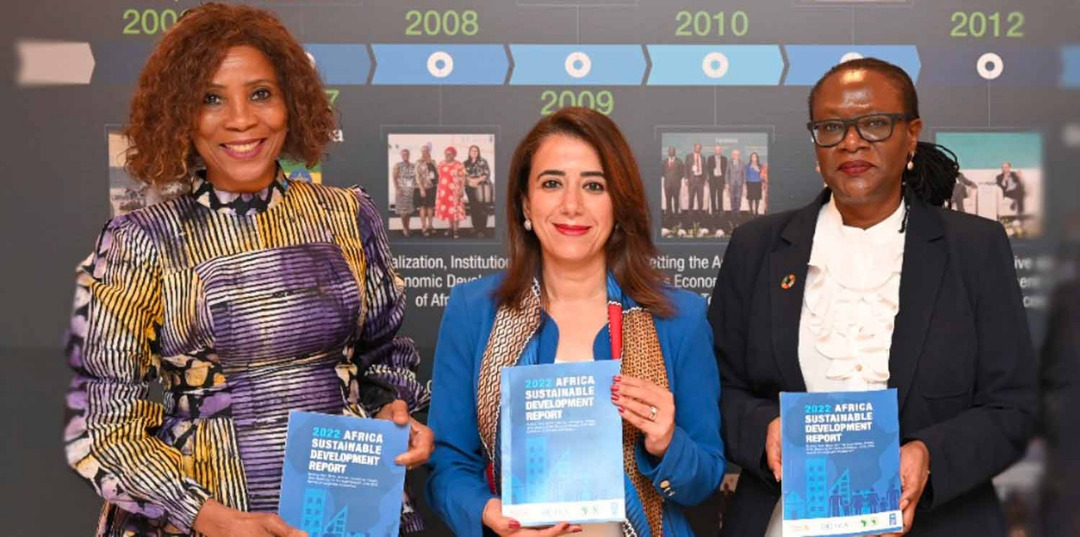|
Getting your Trinity Audio player ready…
|
By Baboloki Semele
It is no doubt, the coronavirus pandemic, the war in Ukraine, and climate change have all hampered Africa’s progress toward meeting the Sustainable Development Goals (SDGs). Reports indicate that with 2030 less than 8 years away, most African countries are struggling to meet the SDG targets, and without renewed efforts, nearly 492 million Africans will be left in extreme poverty with at least 350 million still in that condition in 2050. Against this backdrop, the African Union Commission (AUC), the United Nations Economic Commission for Africa (ECA), the African Development Bank, and the United Nations Development Programme (UNDP) jointly released a status report on the SDGs during the African Economic Conference 2022 that took place in Mauritius.
According to a press release from the African Development Bank, the report dubbed Building Back Better from the Coronavirus Disease, While Advancing the Full Implementation of the 2030 Agenda for Sustainable Development evaluates Africa’s progress towards the SDGs and the African Union’s Agenda 2063 in the context of the triple crises of COVID-19, climate change, and the war in Ukraine which all have hampered the continent’s performance toward both sets of targets.
The release quotes UNDP’s Assistant Administrator and Regional Director for Africa, Ms. Ahunna Eziakonwa who says “Africa can no longer wait on the margins, and the time is now for the continent to rechart its development path and own its development agenda.”
The 2022 Africa SDGs report gives an in-depth analysis of five SDGs: Goal 4 (Quality Education), Goal 5 (Gender Equality), Goal 14 (Life Below Water), Goal 15 (Life on Land), and Goal 17 (Partnerships for the Goals).
Some highlights of the report are below:
SDG 4: Quality Education
Africa has made slow progress in the provision of quality education for all. Despite considerable improvement in school enrolment, 288 million school-age children are not enrolled in school, especially in countries affected by conflict. According to the report, increased funding for education infrastructure is needed, especially at the pre-primary and primary education levels. Other areas in need of investment are the training of teachers and digital connectivity.
SDG 5: Gender Equality
The report indicates slow progress across Africa toward gender inclusivity and recommends the enforcement of legal frameworks to protect women and girls against discrimination, domestic violence, child marriage, and female genital mutilation. For instance, despite women comprising a significant proportion of Africa’s labour force, only 29.8% of managerial positions across the continent, excluding North Africa, were held by women in 2022, up modestly from 29.3% in 2015.
SDG 14: Life Below Water
Organic and chemical pollutants from human activities continue to endanger Africa’s marine ecosystem. The report calls for enhanced institutional capacity to enforce laws and regulations for the sustainable use of marine resources. Life underwater is an important source of livelihood for many African countries, especially its small island developing states (SIDS).
SDG 15: Life on Land
The report finds that loss of forest cover, biodiversity, and land degradation remains high and widespread in Africa owing to deforestation for farming and grazing, and climate change. Land degradation affects 46% of Africa’s land and 65% of the population, costing the region US$9.3 billion annually. More public and private partnerships are critical to mobilise and channel funding to scale up sustainable management of land, forests, and biodiversity towards a green and resilient recovery.
SDG17: Partnerships
The continent has made halting progress on this benchmark, according to the report. Africa’s domestic revenue generation and foreign direct investment inflows continue to lag behind other regions. Debt management remains a persistent challenge for African governments, and debt servicing reduces already scarce capital resources. In 2020, Africa lost about $89 billion to illicit financial flows (IFFs).
The press release further says the report offers several recommendations, among others, strengthening domestic resource mobilisation and curbing illicit financial flows. It also proposes seeking support from international actors to roll out innovative financial instruments such as green and blue bonds, and debt-for-climate swaps.
According to the African Development Bank Group secretary general, Vincent O. Nmehielle, “We have to do more as a continent for better results. Knowing the challenges we have, it is important that we look inward and find a way to implement home-grown initiatives to tackle challenges. The partnership between AfDB, ECA, AUC, and UNDP is a good platform that presents the challenges for our countries to tackle.”
The sentiments were corroborated by Dr. Hanan Morsy, Deputy Executive Secretary and Chief Economist of ECA, who requested Member States to utilize the report as a self-evaluation mode.
“I am hopeful that the findings and recommendations of the 2022 Africa SDGs Report will help member states to take urgent action to accelerate attainment of the SDGs and the agenda 2063,” he said.
And according to the release, to get back on track, Africa needs to foster its domestic resource mobilisation and savings, as well as boost its Information and Communication Technology infrastructure to drive achievement of the SDGs and the Agenda 2063.
